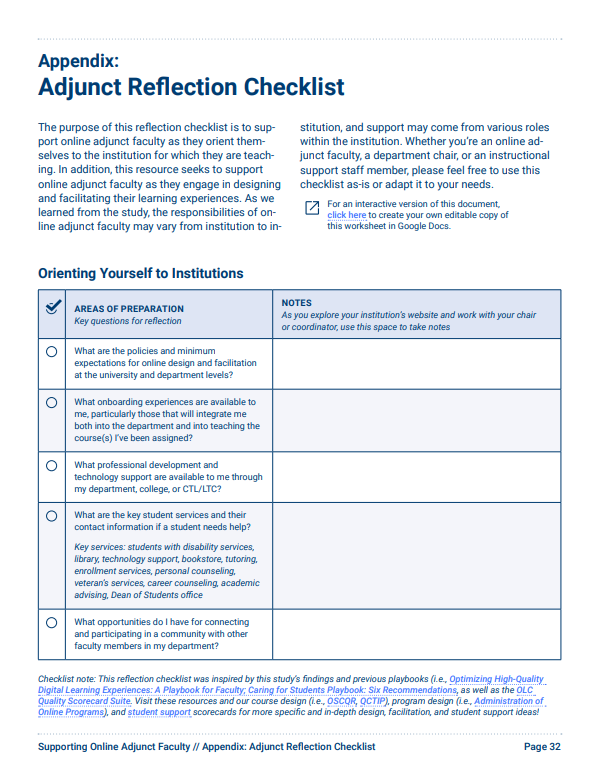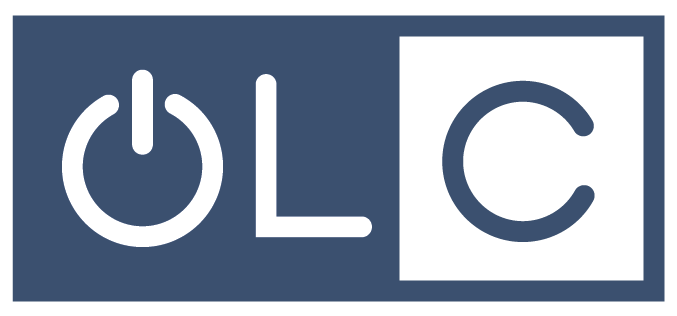Findings from a recent survey of institutional policies regarding adjunct faculty conducted by the WICHE Cooperative for Educational Technologies (WCET) and the Online Learning Consortium (OLC) suggest a need for more support for online adjunct faculty.
“We know that when we support online adjunct faculty or when institutions support online adjunct faculty, essentially what they’re doing is supporting student success,” explains Dr. Abby McGuire, Director of Research at OLC. “This research was our way to look at the framework and to see what structures institutions have in place for some of these key pieces like training, development, and onboarding.”
Based on the survey’s findings, WCET, OLC, and Every Learner Everywhere developed a new playbook, Supporting Online Adjunct Faculty Across Institutional Roles: An Inclusive Playbook for Academic Leaders and Instructional Support Staff, which extends the survey’s findings to provide actionable strategies.
“Online learning is increasing, and a good number of courses across institutions in the U.S. are being taught by adjunct faculty,” explains Dr. Nicole Weber, Associate Vice President of Learning at OLC. “In our work we found that institutions support their adjunct online faculty in varying ways, through different departments and units on campus. With this playbook we wanted to provide flexible strategies that anybody who’s onboarding adjunct faculty can pick up to help them hit the ground running.”
Six actionable strategies for supporting online adjunct faculty
The bulk of “Supporting Online Adjunct Faculty Across Institutional Roles” is devoted to six actionable strategies higher education leaders can use to provide a solid foundation for their online adjunct faculty. These strategies include:
- establishing clear expectations for online teaching;
- developing effective onboarding and training experiences;
- creating opportunities for connection and community;
- using data to maximize the quality of instruction;
- incentivizing key professional development areas; and
- recognizing exemplary online adjunct faculty.
Each section of the playbook outlines supporting research, resources, voices from the field, model programs, and practical activities that can be implemented by three distinct leadership groups within an institution — executive (e.g., provosts, chancellors, presidents), academic (e.g., department chairs, program coordinators, deans), and instructional support (e.g., instructional designers, faculty developers, technology trainers, directors of centers for teaching and learning).
“We realized institutions are handling onboarding and acclimating their online adjunct faculty to their work very differently,” Weber says. “Educators in different roles have different levels of influence and responsibility for onboarding adjunct faculty and in supporting them. We wanted to develop clear ways to support adjunct faculty, depending on how administrators, faculty, and staff interact with them.”
In addition to the survey results, the playbook was informed by follow-up interviews OLC staff conducted with survey participants. These interviews included participants from institutions with centralized organizational structures for addressing online adjunct faculty guidance, as well as those with a more “pocketed” approach.
“We combed through those interviews to look at innovative strategies institutions were using,” McGuire says. “What are they doing to build supports? How are they communicating information to their faculty? How are they incentivizing? How are they compensating them for training? As those pieces emerged from the data, we extended them to become actionable strategies.”
The stories of specific work from the field particularly inspired Weber. “We’re really excited about elevating these voices from campuses across the United States,” she says. “We tried to get a diversity of examples people can implement to support their adjuncts immediately.”
Adjunct reflection checklist
 As institutions work through implementing the six actional strategies, both leadership and adjunct faculty can check their progress through a checklist included in the appendix. (Click here to create a copy of the checklist for your own use.) It encourages faculty to reflect on questions such as:
As institutions work through implementing the six actional strategies, both leadership and adjunct faculty can check their progress through a checklist included in the appendix. (Click here to create a copy of the checklist for your own use.) It encourages faculty to reflect on questions such as:
- What professional development and technology supports are available to me through my department, college, or CTL/LTC?
- How am I actively centering students in creating an equitable and inclusive collaborative community that fosters deep interaction and content opportunities to enhance the learning experience?
- How can I engage my students early in the semester to build community and to acclimate them to the course topics and tools?
The adjunct reflection checklist is also a tool department chairs and program coordinators can use when onboarding adjunct faculty and that instructional support staff can use during adjunct faculty professional development. “If you’re a leader, you can look for these things through the lens of your adjunct faculty and see if you’re providing those things,” McGuire explains.
Weber adds that adjunct faculty who are not yet receiving that much professional development can use the checklist to orient themselves to their institution, as well as design their learning experiences. “We want people to download it, remix it, reuse it, and use it as they please,” she says.
Enabling equity-centered online instruction by adjuncts
“Supporting Online Adjunct Faculty Across Institutional Roles” was designed with online instructors particularly in mind, Weber says. The checklist — along with the actionable strategies in the body of the playbook — assist institutions committed to building more equitable learning conditions in their online courses, something that emerged as a particular challenge in the survey.
“Online adjuncts are often professionals in the field. They have a traditional job during the day, so they may not have a ton of time,” she explains. “The key is to leverage different strategies and modalities to create community and professional development opportunities to help instructors design and facilitate inclusive classrooms, no matter where they might be.”
“The backbone of the playbook is really about creating a sense of connection,” McGuire adds. “Connection is really the heart of learning. As we built the actionable strategies, each of them plays off connection. Whenever we’re helping adjunct faculty create connections, we’re helping them become an integral member of the campus community. We’re setting them up for success and helping students succeed.”
Download Supporting Online Adjunct Faculty Across Institutional Roles



